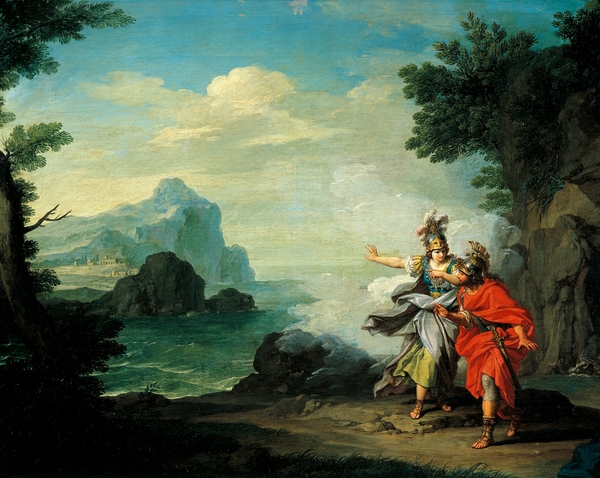A tricky coming home
Kindred spirits, our hero and his guardian goddess. Considered in a favorable light, a case could be made that the characteristics that unite Athena and Odysseus are those of intelligence, cleverness, shrewdness and super quick with a plan for all occasions. A couple of strategists you could say! Less charitably, but equally apt, is that we have here a duplicitous pair of incorrigible schemers and tricksters! And the sympathy Athena and Odysseus share for one another is tempered by their conceits, be they godly or very human. Just who is the cleverest of us all? I am! – cries she. No, I am! – returns he. Between these two, stuff is always complicated. But before they can go toe to toe and show off their stuff, Odysseus has to get home.
And it is Odysseus’ long delayed homecoming that opens the next book of the epic. Having survived the dangers of foreign shores and treacherous seas, nostos describes the very special return of the Ancient Greek hero, one such as Odysseus, to the land of their fathers.
BOOK 13: Two tricksters
pp. 316-331

And the time came for Odysseus to bid farewell to the Phaecians; they who were such a willing audience to his tales of tribulations and conceits, and offered so much hospitality in return. With all honor hosts and guest feasted together for one last time, and then King Alcinious sent Odysseus on his way – and with his finest ship and crew and a trove of gifts.
Odysseus slept at last the sleep of the contented, and when he woke the crew had left him with all his abundant gifts near the Nereids’ cave on Ithaca shore; so disguised by Athena that Odysseus would not recognize it as his home (to what end? ). Not so lucky the brave crewmen who, upon their home journey, met their fate at the hands of the ever vengeful Poseidon. The Phaecians must pay highly for their Gastfreundshaft.

Athena reveals Ithaca to Odysseus 
Athena transforms Odysseus into a beggar
Athena, under the guise of a shepherd boy, tells Odysseus that he is on Ithaca, and, delighted as he may by these words that he so longed to hear, he is not convinced, and in turn does not reveal himself but spins a tale of Crete, of Troy, of murderous and heroic escapades. To which Athena is mightily impressed and unmasks herself with words as much about herself as about Odysseus:
"To outwit you in all your tricks, a person or a god would need to be an expert at deceit. You clever rascal! So duplicitous, so talented at lying! You love fiction and tricks so deeply, you refuse to stop even in your own land. Yes, both of us are smart. No man can plan and talk like you, and I am known among the gods for insight and craftiness.You failed to recognize me: I am Athena, child of Zeus. I always stand near you and take car of you, in all your hardships... "The Odyssey" Book 13 [292-303]
The ever wary Odysseus, still doubting of Athena’s rectitude, is only persuaded of the reality of his homecoming after the goddess raises the mist she has cast, and he sees there before him indeed his beloved land – and kisses the fertile ground he has so longed to have beneath his weary feet. Athena tells Odysseus of all the hardships faced by his wife and son at the mercy of the ill-intentioned suitors, and together they plan the demise of this disreputable troop of young men; and this, like most things with Athena, means undercover work – and a disguise! Our hero with a tap of the goddess’ golden wand is now a shriveled beggar, and soon the pair part ways – Athena to fetch Telemachus, still in Sparta, and Odysseus to seek information of his family and the all the goings-on from the loyal swineherd.
BOOK 14: a loyal slave
pp. 332-349
In the preposterous disguise conjured by Athena, Odysseus goes to the humble abode of the slave, Eumaeus; a simple swineherd, who has remained loyal to the memory of his master and to his family during his long absence; irrespective that he believes Odysseus to be long lost to the mortal world. Eumaeus saves Odysseus from a savage dog, welcomes him, is hospitable and generous with the little he possesses – and his generosity is certainly tested by his probing guest. He gladly feeds, clothes and lodges the stranger in his midst; listens to his story, falls for his tricks. Odysseus reiterates somewhat, and augments even more, the false history of his person that he had tried to spin to Athena (and we know how far he got with that!), all the time testing the loyalty of the swineherd. Eumaeus proves himself in every way – but that Odysseus lives he doubts still.
